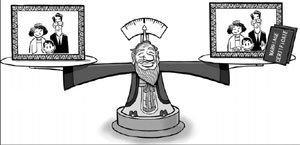Confucianism without good old marriage
By Sam Crane (China Daily)Updated: 2007-03-01 07:09
The decline of marriage in many advanced industrial societies raises questions for various philosophies of social order, Confucianism included.
First, some facts. An analysis released last fall by the US Census Bureau found that less than half of all American households are now made up of married couples. In East Asia, more women are postponing marriage or avoiding it altogether.
 Across Europe more and more young people are choosing to live together and
raise children without formal wedding ceremonies and vows; the French marriage
rate is about 45 percent below the American figure.
Across Europe more and more young people are choosing to live together and
raise children without formal wedding ceremonies and vows; the French marriage
rate is about 45 percent below the American figure.
It's a global trend. Economic growth and transformation engender socio-cultural changes that weaken traditional understandings of family life. Extended families give way to nuclear families which, in turn, yield to a variety of alternative living arrangements. Marriage will likely not disappear altogether but it will not necessarily be taken as the social norm.
For those of us interested in the modern relevance of ancient Chinese thought, the diminution of marriage would seem to undermine the applicability of Confucianism.
It is safe to say that Confucius himself understood a traditional marriage to be the foundation of social organization. Without family and he would have assumed that included a formally married man and woman, raising children and caring for elders there would be no means for cultivating humanity (ren) in the world.
It would appear, then, that without marriage Confucian morality is impossible.
If we think a bit more expansively, however, we may find ways in which Confucian ideals can be adapted to contemporary social practices. There can be humanity without marriage.
For Confucius, morality is a matter of social practice. We must fulfill our obligations and duties to those around us. Those responsibilities are usually understood to begin with the people closest to us, conventionally defined in terms of family: our parents, our spouses, our children, our relatives.
As we continually enact our commitments to our loved ones, we can then extend our network of social relationships outward to non-family others, but we must always be mindful of maintaining and cultivating our established obligations. We should not sacrifice family for friends or strangers.
The nub of the thing, then, is the definition of family. Does it absolutely require a formal marriage between a man and a woman?
A modernized Confucian would want to say "yes", a married man and woman should stand at the center of family. If there is a decline in marriage, the contemporary Confucian would want to know why, and what might be done to reverse it.
Perhaps some sort of moral education, teaching us how to
be better spouses to one another, might be in order. Or, maybe other social
policies, which might make it economically easier to start and maintain formal
marriages, would be a part of a Confucian agenda. 
I don't think, however, that a modern Confucian should demand that a family defined by a married man and woman is the only means for realizing humanity in the world.
First, not all marriages work. If two fundamentally incompatible persons discover that the union they thought would be so beautiful has turned out to be a debilitating and hurtful experience, there is no reason to prolong the agony out of some misplaced social expectation that all marriages are sacrosanct.
This is especially, though not exclusively, important for women, who traditionally were powerless when trapped in horrible marriages. A Confucianism relevant for contemporary life must reject the gender inequality of the past and accept the possibility and morality of divorce.
Second, society has obviously changed, with people developing and extending loving relationships in a wide variety of forms. Many of these associations are built upon daily commitments that, when fulfilled, can function as a means for expressing Confucian humanity in a new context.
What matters for Confucian morality is sincere enactment of one's personal duties to close social relations. If those most intimate bonds are not ratified by a formal recognition of marriage, so be it. It is more important to actually perform duty every day than to worry about official acknowledgement of a certain relationship.
Historically, one of the problems of Confucianism was its tendency to harden into a meaningless formality. People would go through the motions or parrot certain words or sayings, without genuinely committing, in their hearts, to their social responsibilities. That is not what Confucius taught. He expected us to truly believe and feel our connections to our family members:
These days, being a worthy child just means keeping parents well fed. That's what we do for dogs and horses. Everyone can feed their parents but without reverence, they may as well be feeding animals. (Analects, 2.7)
Reverence or we might call it commitment or love is the key. Of course he framed his admonition in terms of a traditional family.
But in a modern, socially diverse context, the sentiment of this passage can be extended to various alternative definitions of family. Our parents do not need to be married to warrant our reverence; and we do not need to be married to owe a continuing obligation to our children.
Sam Crane teaches Chinese philosophy and politics at Williams College in Massachusetts
(China Daily 03/01/2007 page11)
|
|
|
|